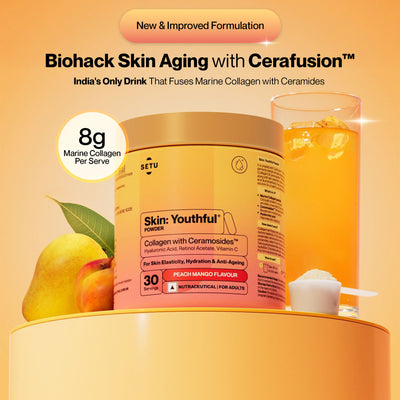Omega: The What, Why & How To Pick?
24 Sep 2020
Omega-3? Omega-6? Omega-9? Fatty Fish? What are these? Are they all different? Do I really need them? Where do I get them? Oh, my omega! No, we don’t mean the Greek alphabet, but the AMAZING nutrient that works wonders for your brain and body.
And yes, we understand, the different types of nutrients and their unique benefits can be overwhelming. Fret not, here we clear all the confusion! We discuss the alpha and omega of this nutrient and answer all your questions here.
What Is Omega?
Omega is the good, essential fat found in food. There are three major types of it: omega-3, omega-6 and omega-9. All these three types are equally important for the body and have several health benefits. Balanced consumption of the three types of omega can help you prevent and manage a number of chronic diseases .
Omega-3: These are polyunsaturated fats that cannot be produced in the human body, hence they are considered essential fats. There are 11 subtypes of omega-3 fats that differ based on their chemical composition, shape and size. Out of the 11, there are three major and most common types are ALA, EPA and DHA.
Alpha-linolenic acid (ALA): This is an 18-carbon fatty acid that is mainly used by the body for energy .
Eicosapentaenoic acid (EPA): It’s a 20-carbon fatty acid that produces chemicals called eicosanoids. Eicosanoids help in reducing inflammation caused by various diseases .
Docosahexaenoic acid (DHA): This 22-carbon fatty acid makes up to 8% of the brain’s weight and is extremely important for the development and normal functioning of the brain .
Omega-3 fatty acids have a number of health benefits and are ideal for those who are looking to improve their heart health, reduce weight and waist size, decrease liver fat and fight inflammation. These fats also work effectively in supporting brain development, preventing dementia and asthma, and also promote bone health.
Foods rich in omega-3 include salmon, mackerel, sardines, anchovies, chia seeds, walnuts, flaxseeds, etc .

Omega-6: Just like omega-3, omega-6 fatty acids are also polyunsaturated fats that need to be obtained from the diet, and are primarily used as energy. The difference between the two fatty acids lies in their chemical compositions. Linoleic acid is the most common type of omega-6 that can be converted to arachidonic acid (ARA). ARA produces pro-inflammatory eicosanoids that are essential for the immune system, help control their cholesterol levels and manage heart diseases .
Soybean oil, corn oil, mayonnaise, walnuts, sunflower seeds, almonds, cashew nuts, etc. are some food items rich in omega-6 .
Omega-9: Unlike omega-3 and omega-6, omega-9 fatty acids are monounsaturated and can be produced in the body. However, consuming food rich in omega-9 can prove to be healthy and beneficial.
Omega-9 fatty acids help in uplifting the mood and can be extremely beneficial for the brain . Olive oil, cashew nut oil, almond oil, avocado oil, peanut oil, almonds, cashews and walnuts are a good source of this nutrient.

Choosing The Right Omega Supplement Based On Your Body’s Requirement
Your body produces omega-9 fatty acids and there are several food items that are rich in the nutrient. Therefore, there’s no such need for omega-9 supplements.
When it comes to omega-6, the diet we consume is high in this nutrient. On average, the ratio of omega-6 to omega-3 consumption is nearly 15:1. Therefore, omega-6 supplements may not be crucial for most people.
However, for omega-3, a dietary supplement may be ideal as our diet is not a sufficient source, and the body cannot produce it on its own. Here’s what you must look for when buying an omega-3 supplement.
Type of omega-3: Many omega-3 supplements often contain a considerably small amount of EPA and DHA, which are the most important types of omega-3. Make sure that the supplement you choose contains these.
Amount of omega-3: Read the labels carefully and ensure that you get a sufficient or required amount of omega-3 in the supplement.
Freshness: Be it omega-3 or any other supplement, you must check the dates before buying them. Omega-3s are prone to going rancid. Once they turn bad, they’ll have a bad odor and lose their potency.
Sustainability: Try to buy fish oil supplements that are verified and certified by appropriate authorities. Fish that are small in size and have a shorter lifespan tend to be sustainable.
Purity and authenticity: Ensure that you buy a supplement from a trusted brand that gives you everything they claim.
Look for your preference: Along with fish oil options, there are several vegetarian options available in the market today. If you prefer to have a fish-free omega-3 supplement, you can get it. Vegetarian alternatives are just as effective and potent.
Setu offers a few options for those who wish to begin an omega-3 supplement regime. Setu Fish Oil is pure omega-3 with maximum absorption for your heart, brain, skin, and body – without the aftertaste. Setu Veg Omega 3 is the 100% vegetarian form of omega-3 that helps improve joint movement, boosts brain function, boosts heart health, and boosts eye health. These products are clinically tested and show no side effects. However, expert consultation is recommended before beginning any supplement regime.
Skin: Renew - Glutathione - Orange Flavour
- ₹1,996
- ₹1,996
-
₹2,600 - ( 23% OFF)
Categories
- Choosing a selection results in a full page refresh.
- Press the space key then arrow keys to make a selection.
this is the sidecart










